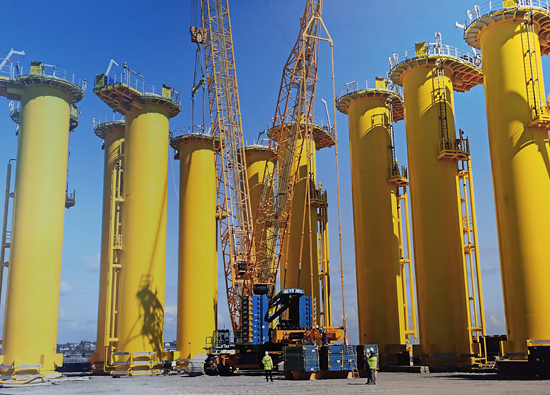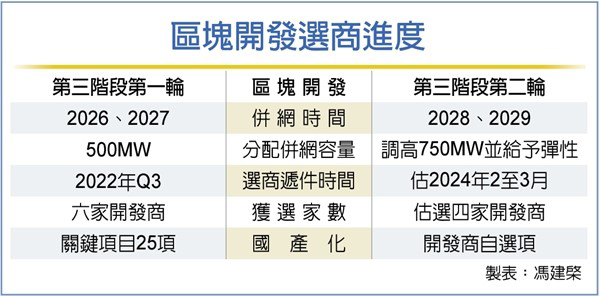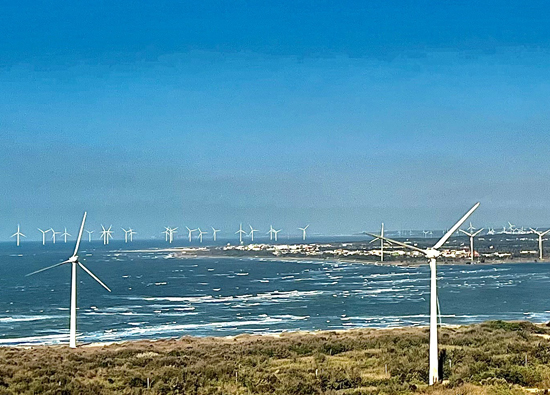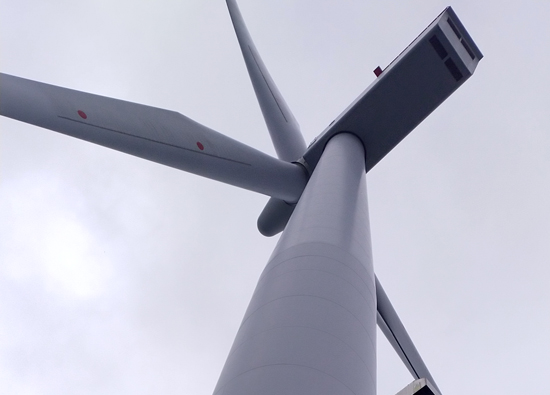09.2023 Special Report
The Dilemma of Offshore Wind Power Policy at the Current Stage
Zhufeng Power Preparation Office / Provided


 The contract was supposed to be signed with the winning bidder of the first phase of the third phase offshore wind power by June 30, 2023, but the progress encountered a headwind. The Energy Bureau stated that 2 out of the 7 wind farms have given up signing contracts and 5 have "applied for signing". Due to the desire of some branch operators for more sufficient pre operation, the signing deadline has been extended for another 2 months. However, it is still uncertain whether the signing can be successful at that time.
The contract was supposed to be signed with the winning bidder of the first phase of the third phase offshore wind power by June 30, 2023, but the progress encountered a headwind. The Energy Bureau stated that 2 out of the 7 wind farms have given up signing contracts and 5 have "applied for signing". Due to the desire of some branch operators for more sufficient pre operation, the signing deadline has been extended for another 2 months. However, it is still uncertain whether the signing can be successful at that time. Controversy Continues in the Third Stage of Offshore Wind Power
Controversy Continues in the Third Stage of Offshore Wind PowerAmong the bid winning manufacturers, the most active Copenhagen Infrastructure Fund (CIP) brought thick signing documents on June 29, including the deposit for each purchase, the exclusive locking of plant capacity, and even the recently delivered order for the "Huanhai Emerald Ship" wind power construction ship, to the Energy Bureau in great detail, except that the NTD 1 billion performance bond originally to be paid has changed from "original" to "duplicate".
The Energy Bureau has requested a supplement from CIP for this, and President Xu Naiwen, a director of CIP Taiwan, stated, "The wind farm is an infrastructure project that involves billions of dollars. We have been preparing for procurement and bidding for nearly two and a half years, but were forced to wait with others for an additional two months... When no one (company) pays the performance bond, who is so foolish to pay the performance bond first?" Xu Naiwen also exclaimed, The government should accelerate the handling of the long delayed backup power supply capacity mechanism for wind farms, help buyers who are preparing to sign a "Enterprise Purchase and Sale Agreement" (CPPA) with developers to improve their credit rating, and shorten the process of electricity license review. These bottlenecks are expected to be overcome before CIP can decide whether to participate in the bidding of the first phase of the third phase in the future.
Experts and scholars from various parties have also compiled several suggestions based on the game rules announced by the Energy Bureau of the Ministry of Economic Affairs, including expanding the upper limit of device capacity, flexibly adjusting localization policies, assisting developers in obtaining better electricity selling prices (CPPA), and increasing the participation of the local financial industry.
In July, it was announced that the Energy Bureau was planning to loosen the binding policy, and the second phase of the third phase bidding, originally scheduled for the end of 2023, has been postponed; The Ministry of Economic Affairs also plans to relax the rules for selecting suppliers. The original development capacity will increase from 500MW in the first phase of the third phase to 750MW or even more, and the industrial correlation is expected to achieve 60% localization from the current 25 items in the five major categories. The relaxation allows developers to choose localization projects themselves, as long as the investment amount reaches 60% localization.
It is reported that due to the superior development conditions in the second phase of the third phase compared to the first phase, the development cost has significantly decreased. Once the decision is made, it is likely that the winning bidder in the first phase will abandon the bid and invest in the second phase bidding. As a result, the energy bureau's offshore wind power installation capacity target (1.5GW per year from 2026 to 2031) may not be achieved in 2026 and 2027, and the remaining amount must be evenly distributed among the bidding in the second and third phases. However, the originally planned construction capacity of 1.5GW is the annual construction capacity that Taiwanese suppliers can undertake. If it increases to 2.0-2.5GW, will Taiwan's infrastructure (ports) be sufficient? Can supply chain energy support it? If not, the localization regulations may become meaningless again, and the construction of the third stage of offshore wind power will also be affected.
The difficulty in signing offshore wind contracts and concerns among companies about not being able to buy green power highlights the dilemma faced by Taiwan's green power industry. According to wind power industry experts, international credit rating agencies only give high ratings to TSMC Telecom, while most other semiconductor or panel manufacturers have insufficient credit ratings. Developers are calling for the government to adopt a credit guarantee mechanism to improve the buyer's credit rating, or for public enterprises to purchase green electricity to improve the feasibility of financial financing. Minister of Economy Wang Meihua pointed out that the Ministry of Economy will strive to assist small and medium-sized enterprises in purchasing affordable green electricity, such as launching a "group buying" mechanism, and in the future, promoting offshore wind and telecommunications protection mechanisms to enable large users to purchase green electricity reasonably.
At present, the known scheme of guarantee mechanism for offshore wind telecom is that the power buyer pays the premium, the import and export bank from Chinese Mainland uses the credit insurance fund to provide guarantee (40%) to the power seller, and Taiwan Power buys power at the cost of avoiding (40%), and the financing bank bears the remaining losses (20%). It is not difficult to predict that if the premium is too high at that time, electricity buyers will be unable to afford it; If the premium is too low, the protection is insufficient, and the bank's financing conditions are still unable to be met. Furthermore, the service life of China Export&Credit Insurance Corporation is only 2 years. If there are no other electricity buyers taking over during this period, what will be done in the future? And financing banks need to bear 20% of the losses, which will inevitably lead to an increase in lending rates.
In addition, according to the bidding regulations of the first phase of the third phase, Taiwan Power must purchase surplus electricity at the bidding price. The current avoidance cost is 1.8 yuan, but the actual bidding price is NTD0. If Taiwan Power purchases electricity at the avoidance cost, it will clearly violate the bidding regulations and contract content. Under these conditions, Taiwan Power can purchase at a low price and then sell at a high price. If the sale is not successful, it can still obtain green electricity with renewable energy certificates at a low price to reduce carbon emissions.
The Ministry of Economic Affairs emphasizes that building a wind farm is a time-consuming and labor-intensive large-scale project, and the integrity and ability of the owner to fulfill the contract are important conditions. If one participates in bidding and expresses a willingness to sign a contract and requests an extension, but ultimately refuses to sign, it will inevitably damage commercial integrity; If the first phase of the third stage wind farm participates in the bidding but is unable to sign the contract for execution, the construction ability of the subsequent phases will also be questioned by stakeholders such as banks.
To prevent a possible wave of bid abandonment, according to insiders, new blacklist regulations will be formulated for the third and second phase of the bidding process. If the first phase of the bidding application is extended and the contract is not signed by the end of August, the bidding qualification for the second phase will be lost; If the contractor abandons the contract at the end of June, participating in the next round of business selection will result in a deduction of points. Considering that some wind farms are joint ventures, a certain shareholding ratio or higher will also be set to apply the new regulations.
Anyway, the unfavorable promotion of offshore wind power will result in a shortage of green power in Taiwan, and the entire population will be the losers.
#


















